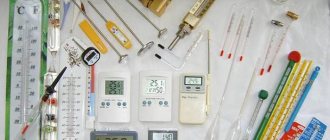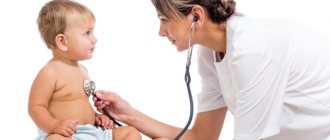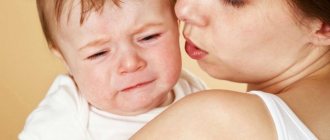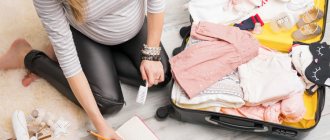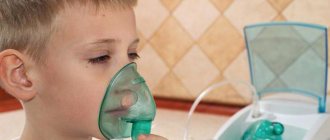The importance of the first bath
Bathing a newborn baby for the first time after being discharged from the hospital is one of the most exciting moments in the life of parents. The first experience is very important for the baby, as it will shape his attitude towards this procedure for a long time.
Not all pediatricians recommend bathing the baby on the day of discharge, especially if the umbilical cord and clothespin have not yet fallen off. It will be enough to carefully wipe the skin with a sponge or cloth moistened with water. On the second or third day, you can immerse the baby in the bath. Although many experts believe that already on the first day the child is ready for water procedures.
First bath
In addition to hygiene, the benefits of bathing include:
- activation of blood circulation and metabolic processes;
- hardening effect;
- relaxing effect on muscles, which is especially useful for muscle hypertonicity;
- stimulation of immunity;
- easing intestinal colic.
Important! During the first bath, the umbilical wound is still open, so the water for bathing should be boiled. Bacteria and microorganisms are likely to be present in running water.
Old recommendations about adding potassium permanganate to water to disinfect it are refuted today, since the doses of the substance required to destroy microbes are so large that they can burn the skin of a baby, and weak solutions are useless.
Possibility of swimming if you have a cold
Whether it is possible to bathe a newborn baby with a cold depends on the severity of its symptoms. If the baby just has a cough or runny nose, then you should not refuse to take baths. They will even be useful, as they help remove toxins and microbes released through the sweat glands. If the baby has the flu with a high temperature, then swimming is not allowed, because complications may develop.
Is it necessary to walk with your child every day - why is it necessary?
Parents often doubt whether it is possible to bathe a child if he has chickenpox. This may not resolve until early in the disease when the body temperature is elevated. After it subsides, the baby can take baths with the addition of a decoction of celandine or medicinal chamomile, which will relieve itching and promote the healing of ulcers. It is not recommended to wash your child with a washcloth using soap or shampoos.
Important! The completed vaccination, including vaccination against hepatitis, is not an obstacle to swimming, only in case of negative reactions to the vaccine.
Conjunctivitis, or inflammation of the mucous membrane of the eye, sometimes with suppuration, can also be accompanied by fever, especially if the disease is not associated with an allergy, but with an infection. During this period, the baby should not bathe. After alleviating his condition, water procedures can be resumed, but without using soap and being careful not to allow water to get into the eyes.
How often should a one-year-old baby be bathed?
August 19, 2014
Whatever one may say, almost every new parent asks this question, and there is nothing surprising in this, because if this question worries a parent, then he is simply a “good” and “caring” parent. But actually, the purpose of our article is not to talk about what kind of parent this or that parent is, but to find an answer to the question of how often a one-year-old child should be bathed. However, the answer is quite simple...
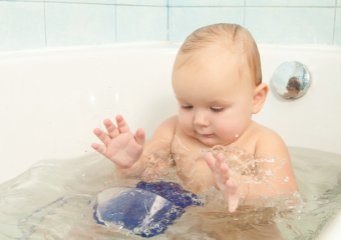
You need to bathe a one-year-old child exactly as much as he needs it. And we are not talking about constant bathing after diapers, but about complete washing, which should occur at least once a day. Why so often? Yes, because a one-year-old child’s skin is still too tender, and therefore each of its folds needs to be treated as often as possible so that no irritations or wounds form.
The question of how exactly all this should happen is a completely different matter. There are two options here. The first option is to bathe in a herbal decoction. This herb should preferably be either string or chamomile. The second option is bathing in the shower, but this has its own nuances. Firstly, the shower must be fully treated with antibacterial agents before each bath. Secondly, if a child bathes in the shower, then more serious requirements are put forward for it. For example, such a shower must have a good seal, a good water filter and much more. By the way, since we are talking about shutters, it would not be out of place to say that the best option is hutterer lechner - ladders with a dry shutter.
Well, in general, try to trust your own intuition more, because you are now a mother (father), and you should feel more when and what your baby needs. Swimming is, of course, good, but even here you need to know when to stop. In general, the best option is to consult a pediatrician, because he certainly knows better what your child needs, what is contraindicated, and what, on the contrary, will be useful...
Bathing accessories
Menu for a one-year-old child every day
The first bath may be difficult due to lack of experience, but then everything will go much faster. Before starting the procedure, you need to prepare everything:

Bathing accessories
- Set up a bathing area. It is best to place the baby bath near the changing area and baby clothes to avoid transferring a wet baby;
Important! Be sure to take care of the correct air temperature in the bathing area. Its optimal value is 25ºC.
- Arrange children's bathing accessories in advance: soap (shampoo), sponge or mitten, towel, napkins, ladle for rinsing with water;
- After bathing, you may need hygiene products: cream, brilliant green, cotton swabs, boiled water for washing eyes, baby powder, etc.;
- Dressing the child after bathing is done very quickly so that the baby does not catch a cold. Therefore, clothes should be at hand;
- The bath water temperature for a newborn baby should be around 37ºC. To control it, you will need a water thermometer;
- The duration of the first baths is only a few minutes. Therefore, you need to put a clock nearby.
Important! While taking a bath, you need to be careful not to make sudden movements so as not to scare the baby. You need to do everything calmly and smoothly, talking with the child so that he feels safe.
BabyMother
In my ideal picture of the world, children are bathed before bed, they calm down, read a book and go to sleep. This topic doesn’t work with my boys (2 years old and 3.5 years old). We have curfew at 8.00 at 7.10-7.20 I start bathing them, I bathe them for 10-15 minutes and after I take them out, all hell and trash begins. They run around the apartment, scream, jump from tables, jump on the bed, push, and neigh like horses (you know that laugh like a hyena’s when you can’t breathe and you’re laughing on the exhale??) If when they were 6 months and 2 years old resp. We were wildly touched by this and we called it “evening rush”, but now it infuriates us. Because they get so excited that in order to calm them down, you need to shout well and get them out of this trance. Yesterday I was putting them away alone, my husband was on a business trip, and I freaked out so much that I grabbed the older one by the hands and forcefully pushed him to the floor and kicked the pot against the wall. He burst into tears (not from pain, but rather from fear and resentment) Has this happened to you?? What should I do? Maybe this is an evening swim? But I can't put dirty kids to bed.. Should I bathe them early so they'll freak out before bed? At what time? AT 6? At 6 we are still walking. And it’s stupid to bathe them before the party, they’ll get dusty and sweaty. Please give me some advice, I lost my nerves yesterday. They are also difficult to fit. Everyone has their own bed, but they lie there and laugh. They make funny sounds and neigh in the dark, I just growl to keep them quiet. In a month we are actually moving into a house, there will be separate bedrooms, I hope this will solve the problem of falling asleep. What to do with the “evening rut”?
I want to ask if there are other kids like this for whom taking a bath does not have a calming effect, but rather turns on the child’s propeller in one place? What time do you bathe your kinders? otherwise, if we bathe at 20-21...then Hollywood is guaranteed for us until one in the morning. We bathe, on the recommendation of a neurologist, in pine needles, valerian, but for some reason it doesn’t work, it seems to me... We bathe every other day (the bathroom is very cold, so we have to warm it up with a heater in advance) maybe there is something you picked up to calm the children’s nervous system? (we get excited in the evening, in the morning the baby is cheerful and calm, and by the evening the devils get married))))))
Baby's sleep and nutrition are the two things that concern most new parents. Many mothers feel that no one else has problems like theirs. But believe me, there is a way out of any situation. Let's look at the most frequently asked questions.
Do all babies need naps?
For children under two years of age, napping during the day is not a recommendation, but rather a necessity. Experts advise parents to maintain daytime naps until the child is 6-7 years old, because it improves concentration and has a positive effect on the baby’s health.
But all children are different. Some may categorically refuse to go to bed during the day. Such children usually get enough sleep at night. In the evening they go to bed a little earlier, and in the morning they get up a little later. In such situations, there is no need to worry. If the baby feels good, is cheerful and cheerful, then everything is fine. Alternatively, encourage your child to simply lie down during the day and listen to music.
We're leaving on vacation. Will my child have trouble sleeping?
No need to worry about this. The baby's body adapts well to small changes in the daily routine and can independently regulate the amount of sleep. For example, you went on vacation with the whole family, and the baby went to bed half an hour later than usual, then in the morning he is also half an hour later. In a couple of days everything will fall into place.
What to do if your child doesn’t sleep until midnight or longer?
In this case, an integrated approach is needed. First, move your baby's afternoon nap earlier so that he gets tired in the evening. Secondly, stick to a bedtime ritual: bathing, quiet games, bedtime story.
You may need to lie down next to your baby. If necessary, you can consult a neurologist. But most likely you will be recommended massage and swimming. Consulting a homeopath can be very helpful.
Evening bathing excites the child, and he cannot fall asleep...
Typically, during the process of massage and bathing, the child spends a lot of energy, gets tired and, therefore, falls asleep faster, after which he sleeps well throughout the night. But in some cases, the baby wakes up after 30 minutes, and it is very difficult to put him down again.
This is because the excitement and energy generated during these procedures must find an outlet. In this case, it is better to shift the water procedures to an earlier time. Bathe your baby during the day, at a time convenient for you.
Do you need complete silence when your baby is sleeping?
Many mothers try to ensure complete silence while their babies sleep (turn off the TV, speak in a whisper, walk on tiptoe, etc.), but this is not correct. A baby who is used to sleeping in complete silence may wake up from the slightest noise. Of course, when the baby falls asleep, you need to turn down the music or TV and avoid loud sounds, but the natural sound background should remain. This is especially true for daytime sleep.
Optimal bathing frequency
Experts are divided on the frequency of bathing. Those who advocate the need for a daily bath explain why it is important not only for hygiene, but also for the need to form an emotional bond between parents and child, as well as the strengthening effect.
Soup for an 8 month old baby - recipes for every day
Other pediatricians do not understand why a newborn needs to be bathed every day, because a child up to one year old practically does not get dirty, except for the diaper area, which can be cared for without daily bathing.
Important! Excessive bathing can remove the protective fat layer of the skin and make your baby more susceptible to infections and rashes.
In the summer months, when the baby sweats more, daily baths are acceptable, and in extreme heat it is possible to take them several times throughout the day. Is it possible to wash the baby with shampoo and soap? No, they are not recommended to be used more than once every 3 days.
In winter, especially if it is impossible to ensure the proper temperature in the room for water procedures, it is enough to bathe the baby twice or thrice a week.
In spring, bathing has the greatest hardening effect, so you can do it every day, periodically pouring water on the baby at a lower temperature (1-2ºC less) than the temperature of the water in the bath.

Tempering douches for a baby
why bathe your baby every day
https://kids-flowers.ru
Hello dear subscribers and readers ! A newborn can be bathed starting from the 5th day of life. You should not bathe your baby on the first day after discharge. Wait 1-2 days, get used to the baby a little and let him get used to the new space of your apartment.
Babies in the first month of life need to be bathed daily. The first month of life, bathing lasts 5-10 minutes. Before bathing, you need to thoroughly wash the bathtub with special cleaning products for small children, and then rinse several times to keep the water clean. You need to fill a bath with tap water; there is no need to boil the water. The bath must be filled 2/3 with water.
The temperature in the bathing room is 26-28 C, the water temperature in the bath is 37-38 C. Of course, use a water thermometer to measure the temperature. You should not make a steam room out of the bathing room, since when you take the child into the room the contrast in temperature will be too great, so we advise you not to close the door in the bathroom.
For bathing children in the first month, it is recommended to use a special plastic bathtub for a newborn; it is more convenient and safer. After a month, when the child’s movements become more active, it would be best to move to a larger bathroom.
For the first 2-3 days, it is advisable to bathe the child with the addition of a small amount of potassium permanganate so that the water is slightly yellow. After this, you can add chamomile decoction, but only a small amount so that the water is slightly yellowish. If the child's skin reacts well, then continue to bathe in chamomile; there is no need to add different herbs every day. Until the umbilical wound heals, continue bathing in the decoction or potassium permanganate.
Prepare in advance a diaper on which to place the baby, a cap, a clean diaper, a blouse and pants with socks or closed legs, or overalls, you can also wear anti-scratch protectors, preferably clothes with long sleeves, since after a bath babies quickly lose heat.
It is better to bathe your baby before feeding, so that after taking a bath you can feed him and put him to bed.
Bathing process
You need to lower the child into the bath carefully, starting from the legs, so as not to scare the baby and let him get used to the water, gradually holding his head on his hand up to the chest.
After a month, you can move the child to a larger bathroom and increase bathing time.
Use your hand to stroke all the baby's folds, don't forget about the neck and elbow folds. There is no need to use sponges or washcloths. It is advisable to use detergents once a week; you do not need to use them every day so as not to dry out the newborn’s skin. When buying a washing gel, make sure that it is specifically for children from 0 years old, as they are available for different ages. The first month the baby does not need any toys or other accessories, but after a month he will look at them with interest and the bathing procedure will become a fun process.
After the procedure, you need to rinse your baby from top to bottom with clean water one degree higher than the water in the bathroom to wash off the soapy water from the skin.
Separately, it should be added that there are many accessories for bathing that make the process easier and more convenient; of course, you need to look at which ones your baby will like. The most necessary of them is a bathing ring, an indispensable thing for you and your child. When purchasing, pay attention to the indicated age, as they differ in size. After swimming
After the bath, put the baby on a diaper and blot the wet skin with the diaper; there is no need to wipe or rub the baby's skin, as it is very delicate, just blot it. After daily bathing, there is no need to treat the baby's folds with oil; the baby is hungry, so you should not torment him with these procedures, this can be done at another time. Dress your baby in prepared clothes. The cap must be worn for an hour and a half while the child’s head is wet.
It is also not recommended to swaddle the child, so as not to hamper movement; only in loose clothing will the child’s muscles work.
I will be glad to have my subscribers and everyone who visits my blog, leave your wishes in the comments, I will definitely take them into account. Happy viewing and reading. Yours Irina.
When and for how long to bathe a baby
As for the bathing schedule, any time of the day is suitable for taking a bath.
Important! Water treatments should be avoided immediately after feeding, as this can cause regurgitation.
Many parents consider the best time to be in the evening, when bathing becomes a ritual before falling asleep. It promotes healthy sleep habits, helping your baby relax.
The duration of the first baths is no more than 3 minutes, gradually it can be increased, bringing it to 20 minutes.
Important! You should not allow your baby to stay in water that contains foam from soaps and shampoos for a long time.
Bathing and washing
The process of washing the baby is purely hygienic, ensuring the cleanliness of the diaper area, and bathing helps to improve the physical and emotional state of the baby and the formation of mutual affection between him and his parents.

Washing the baby
What to do after swimming
Some procedures that should be used to complete a baby’s bath:
- Use a towel to dry the baby's skin without rubbing, just gently blotting;
- If the wound on the navel has not yet healed, it is treated;
- To prevent diaper rash, baby cream is applied to the folds;
- Apply special oil for children to dry skin;
- Redness on the skin and in folds is treated with powder;
- All droplets of water are carefully removed from the ear area, and a cap is put on;
- The diaper is put on, then the rest of the clothes.
Whether a baby will love to swim depends on his first experience of interacting with water. By following the recommendations, parents can turn taking a bath with their baby into great pleasure for themselves and him.

